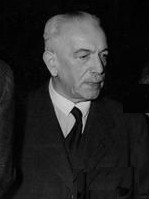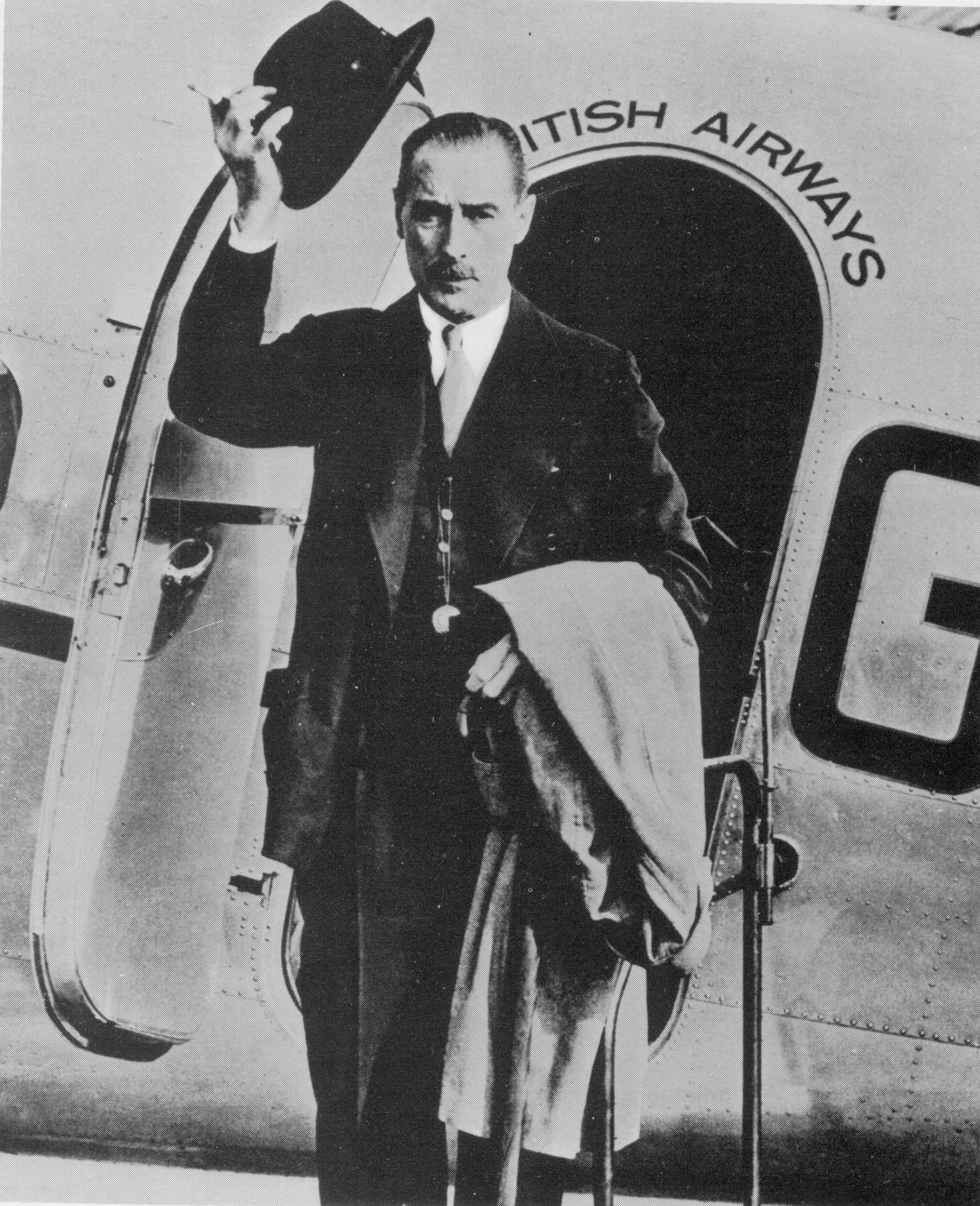|
Anti-Comintern Pact
The Anti-Comintern Pact, officially the Agreement against the Communist International was an anti-communist pact concluded between Nazi Germany and the Empire of Japan on 25 November 1936 and was directed against the Communist International (Comintern). It was signed by German ambassador-at-large Joachim von Ribbentrop and Japanese ambassador to Germany Kintomo Mushanokōji. Kingdom of Italy, Italy joined in 1937 (earlier it had signed the Italo-Soviet Pact directed partly against Hitler), but it was legally recognized as an original signatory by the terms of its entry. Francoist Spain, Spain and Hungary joined in 1939. Other countries joined during World War II. The Japanese signatories had hoped that the Anti-Comintern Pact would effectively be an alliance against the Soviet Union, which was how the Soviets perceived it. There was also a secret additional protocol which specified a joint German-Japanese policy specifically aimed against the Soviet Union. After August 1939, Jap ... [...More Info...] [...Related Items...] OR: [Wikipedia] [Google] [Baidu] [Amazon] |
Kintomo Mushanokōji
Viscount was a Japan, Japanese diplomat before and during the Second World War. Biography Mushanokōji was the third son in the 10th generation of aristocratic Mushanokōji family and born in Kōjimachi, Chiyoda, Tokyo, Chiyoda, Japan. He graduated from the Law School of Tokyo Imperial University. His younger brother was part of the delegation to the Eleventh Ordinary Session of the Assembly of the League of Nations and the delegation to the Special Session of the Assembly Convened in Virtue of Article 15 of the Covenant at the Request of the Republic of China (1912–1949), Republic of China Government. From 1929 to 1933, he served as Japanese Ambassador to Sweden and non-resident Ambassador to Finland and in that capacity signed on behalf of the Japanese government the Convention on Certain Questions Relating to the Conflict of Nationality Laws (April 12, 1930). He served as Japanese Ambassador to Germany from 1934 to 1937 and in that capacity signed the Anti-Comintern Pact ... [...More Info...] [...Related Items...] OR: [Wikipedia] [Google] [Baidu] [Amazon] |
Joachim Von Ribbentrop
Ulrich Friedrich-Wilhelm Joachim von Ribbentrop (; 30 April 1893 – 16 October 1946) was a German Nazi politician and diplomat who served as Minister for Foreign Affairs (Germany), Minister of Foreign Affairs of Nazi Germany from 1938 to 1945. Ribbentrop first came to Adolf Hitler's notice as a well-travelled businessman with more knowledge of the outside world than most senior Nazis and as a perceived authority on foreign affairs. He offered his house Schloss Fuschl for the secret meetings in January 1933 that resulted in Hitler's appointment as Chancellor of Germany. He became a close confidant of Hitler, to the dismay of some party members, who thought him unintelligent, superficial and lacking in talent. He was appointed ambassador to the Court of St James's, the royal court of the United Kingdom, in 1936 and then Foreign Minister of Germany in February 1938. Before World War II, he played a key role in brokering the Pact of Steel (an alliance with Kingdom of Italy, Fasc ... [...More Info...] [...Related Items...] OR: [Wikipedia] [Google] [Baidu] [Amazon] |
Weimar Republic
The Weimar Republic, officially known as the German Reich, was the German Reich, German state from 1918 to 1933, during which it was a constitutional republic for the first time in history; hence it is also referred to, and unofficially proclaimed itself, as the German Republic. The period's informal name is derived from the city of Weimar, which hosted the constituent assembly that established its government. In English, the republic was usually simply called "Germany", with "Weimar Republic" (a term introduced by Adolf Hitler in 1929) not commonly used until the 1930s. The Weimar Republic had a semi-presidential system. Toward the end of the First World War (1914–1918), Germany was exhausted and suing for peace, sued for peace in desperate circumstances. Awareness of imminent defeat sparked a German Revolution of 1918–1919, revolution, Abdication of Wilhelm II, the abdication of Kaiser Wilhelm II, the proclamation of the Weimar Republic on 9 November 1918, and formal cessa ... [...More Info...] [...Related Items...] OR: [Wikipedia] [Google] [Baidu] [Amazon] |
Bundesarchiv Bild 183-H04810, Joachim Von Ribbentrop
The German Federal Archives or Bundesarchiv (BArch) (, lit. "Federal Archive") are the national archives of Germany. They were established at the current location in Koblenz in 1952. They are subordinated to the Federal Commissioner for Culture and the Media (Claudia Roth since 2021) under the German Chancellery, and before 1998, to the Federal Ministry of the Interior. On 6 December 2008, the Archives donated 100,000 photos to the public, by making them accessible via Wikimedia Commons. History The federal archive for institutions and authorities in Germany, the first precursor to the present-day Federal Archives, was established in Potsdam, Brandenburg in 1919, a later date than in other European countries. This national archive documented German government dating from the founding of the North German Confederation in 1867. It also included material from the older German Confederation and the Imperial Chamber Court. The oldest documents in this collection dated back to the ... [...More Info...] [...Related Items...] OR: [Wikipedia] [Google] [Baidu] [Amazon] |
Hiroshi Ōshima
Baron was a general in the Imperial Japanese Army, Japanese ambassador to Germany before and during World War II and (unwittingly) a major source of communications intelligence for the Allies. His role was perhaps best summed up by General George C. Marshall, who identified Ōshima as "our main basis of information regarding Hitler's intentions in Europe". After World War II, he was convicted of war crimes and sentenced to life imprisonment, but was paroled in 1955. Biography Early life Ōshima was the son of a provincial low ranking samurai family from Gifu Prefecture. His father, , rose up through the ranks and eventually served as Army Minister from 1916 to 1918. Much was expected of the young Ōshima and his rise in the Imperial Army structure was swift. He graduated from the Imperial Japanese Army Academy in June 1905, a member of the academy's 18th class, and was promoted to second lieutenant in June 1906 and to lieutenant in June 1908. He graduated as a member of the 2 ... [...More Info...] [...Related Items...] OR: [Wikipedia] [Google] [Baidu] [Amazon] |
Konstantin Von Neurath
Konstantin Hermann Karl Freiherr von Neurath (2 February 1873 – 14 August 1956) was a German politician, diplomat and convicted Nazi war criminal who served as Foreign Minister of Germany between 1932 and 1938. Born to a Swabian noble family, Neurath began his diplomatic career in 1901. He fought in World War I and was awarded the Iron Cross for his service. After the war, Neurath served as minister to Denmark, ambassador to Italy and ambassador to Britain. In 1932, he was appointed Foreign Minister by Chancellor Franz von Papen, and he continued to hold the post under Adolf Hitler. In the early years of the Nazi regime, Neurath was regarded as playing a key role in Hitler's foreign policy pursuits in undermining the Treaty of Versailles and in territorial expansion in the prelude to World War II. However, he was often averse to Hitler's aims for tactical, not necessarily ideological, reasons. That aversion eventually induced Hitler to replace Neurath in 1938 with the mor ... [...More Info...] [...Related Items...] OR: [Wikipedia] [Google] [Baidu] [Amazon] |
German Ambassador To The United Kingdom
The Embassy of Germany in London is the diplomatic mission of Germany in the United Kingdom. The embassy is located at Belgrave Square, in Belgravia. It occupies three of the original terraced houses in Belgrave Square and a late 20th-century extension. History From 1842, Christian Charles Josias von Bunsen leased 4 Carlton House Terrace for the Prussian Legation. In March 1849, the legation moved along the terrace to the larger 9 Carlton House Terrace, which was renamed 'Prussia House'. Its purchase was authorised by the ( 13 & 14 Vict. c. ''3''): this was necessary as before the passing of the Naturalization Act 1870 ( 33 & 34 Vict. c. 14), only British subjects could legally own property in England. Count Bernstorff replaced Baron von Bunsen in 1855, becoming the German Ambassador from 1867. During the First World War, the building was occupied by the American Embassy (as protecting power) between 1916 and 1917, and then the Swiss Legation from 1918 to 1920. In 1921 t ... [...More Info...] [...Related Items...] OR: [Wikipedia] [Google] [Baidu] [Amazon] |
Adolf Hitler
Adolf Hitler (20 April 1889 – 30 April 1945) was an Austrian-born German politician who was the dictator of Nazi Germany from 1933 until Death of Adolf Hitler, his suicide in 1945. Adolf Hitler's rise to power, He rose to power as the leader of the Nazi Party, becoming Chancellor of Germany#Nazi Germany (1933–1945), the chancellor in 1933 and then taking the title of in 1934. His invasion of Poland on 1 September 1939 marked the start of the Second World War. He was closely involved in military operations throughout the war and was central to the perpetration of the Holocaust: the genocide of Holocaust victims, about six million Jews and millions of other victims. Hitler was born in Braunau am Inn in Austria-Hungary and moved to German Empire, Germany in 1913. He was decorated during his service in the German Army in the First World War, receiving the Iron Cross. In 1919 he joined the German Workers' Party (DAP), the precursor of the Nazi Party, and in 1921 was app ... [...More Info...] [...Related Items...] OR: [Wikipedia] [Google] [Baidu] [Amazon] |
Anglo-German Naval Agreement
The Anglo-German Naval Agreement (AGNA) of 18 June 1935 was a naval agreement between the United Kingdom and Germany regulating the size of the ''Kriegsmarine'' in relation to the Royal Navy. The Anglo-German Naval Agreement fixed a ratio whereby the total tonnage of the Kriegsmarine was to be 35% of the total tonnage of the Royal Navy on a permanent basis. It was registered in ''League of Nations Treaty Series'' on 12 July 1935. The agreement was abrogated by Adolf Hitler on 28 April 1939. The Anglo-German Naval Agreement was an ambitious attempt on the part of both the British and the Germans to reach better relations, but it ultimately foundered because of conflicting expectations between the two countries. For Germany, the Anglo-German Naval Agreement was intended to mark the beginning of an Anglo-German alliance against France and the Soviet Union, whereas for Britain, the Anglo-German Naval Agreement was to be the beginning of a series of arms limitation agreements that w ... [...More Info...] [...Related Items...] OR: [Wikipedia] [Google] [Baidu] [Amazon] |
Spanish Civil War
The Spanish Civil War () was a military conflict fought from 1936 to 1939 between the Republican faction (Spanish Civil War), Republicans and the Nationalist faction (Spanish Civil War), Nationalists. Republicans were loyal to the Left-wing politics, left-leaning Popular Front (Spain), Popular Front government of the Second Spanish Republic. The opposing Nationalists were an alliance of Falangism, Falangists, monarchists, conservatives, and Traditionalism (Spain), traditionalists led by a National Defense Junta, military junta among whom General Francisco Franco quickly achieved a preponderant role. Due to the international Interwar period#Great Depression, political climate at the time, the war was variously viewed as class struggle, a War of religion, religious struggle, or a struggle between dictatorship and Republicanism, republican democracy, between revolution and counterrevolution, or between fascism and communism. The Nationalists won the war, which ended in early 1939, ... [...More Info...] [...Related Items...] OR: [Wikipedia] [Google] [Baidu] [Amazon] |






